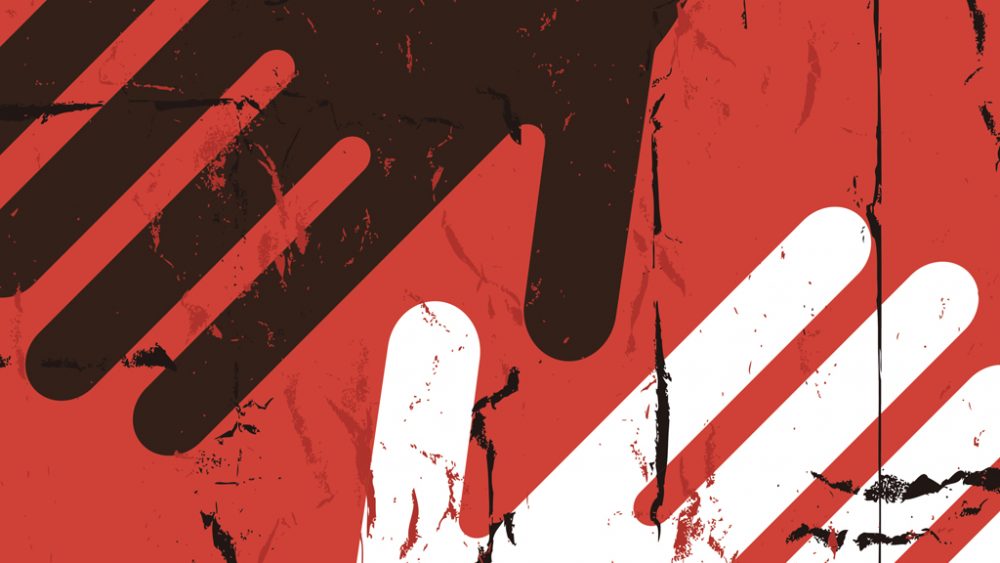Black is Back
The evolution of America's racial language continues.

I have noticed in recent weeks that “Black”—with a capital B—seems to once again be the preferred usage for those who have variously been referred to as “African-American,” “black,” “colored,” and “negro.”
While vestiges of “colored” and “negro” remained in the names of various civil rights organizations founded in earlier days, “black”—usually but not always with a lower-case b—was the preferred usage from the earliest days I can remember (say, 1970) until the early 1990s. While I was in graduate school, Jesse Jackson and others lobbied for “African-American” (sometimes with and sometimes without the hyphen) to be adopted and it gradually was.
“Black,” regardless of capitalization, never went away but over time I tried to force myself to use “African-American,” even though I considered it both clunky and less useful than “black.” (At the time, Tim Russ’ Tuvok character had just debuted on “Star Trek: Voyager” and I recall joking with a fellow grad student who was both a Trek fan and black as to whether “African-American-Vulcan,” “African-Vulcan” was the preferred description.)
As to the seeming reversal in recent months, I’m seeing lots of partial explanations.
WUSA9 (“Black vs. African-American: The complex conversation Black Americans are having about identity #ForTheCulture“):
Greg Carr, an associate professor and the chair of Howard University’s Department of Afro-American Studies, said despite the dictionary definitions, there’s no term that truly describes people that were taken from Africa and forced into slavery.
“We see these debates beginning literally from the time people came here.” Very early on, of course, the label that we were given — whether it be the N-word, or Black, or Negro — were just to give us our status as property.”
The word “colored” emerged in the 19th century to describe Black people in America.
“Because now there’s a struggle particularly among northern Blacks — free Blacks to attempt to acquire some of the rights of America,” Carr said. “They use colored, ironically, to exclude the masses of Negroes.”
Names and identities continued to evolve throughout history, and self-identity within some Black American communities became generational.
“I think any group of human beings responds to their time,” Carr explained. “The consistent thing when it comes to people of African descent in this country is the declaration that we are fully human and that we want to be as free as any other human being.”
Margaret Simms, Urban Institute (“Say African American or Black, but first acknowledge the persistence of structural racism“):
Today, some people view “black” and “African American” interchangeably. But many have strong opinions that “African American” is too restrictive for the current US population. In part, the term African American came into use to highlight that the experiences of the people here reflect both their origins in the African continent and their history on the American continent.
But recent immigrants from Africa and the Caribbean have different combinations of history and experience, so some have argued that the term “black” is more inclusive of the collective experiences of the US population. About 10 percent of the 46.8 million black people in the United States are foreign born.
Contrary to the perception of some, immigrants from Africa are more likely to have a college education than the black population as a whole and the US population as a whole. Data on children of immigrants reveal that 44 percent of children in the United States with parents from Africa and the West Indies have parents with at least a college degree, compared with 24 percent of all black children and 40 percent of all children with native-born parents.
Cydney Adams, CBS News (“Not all black people are African American. Here’s the difference.“):
Black Lives Matter protests have opened up conversations about the history of privilege, racism, and the lived experiences and identities of black people in America. Now, the distinction between “black” and “African American” has become a prominent conversation on social media.
Many people often default to “African American” out of a desire for either political correctness or politeness. The two terms are often used interchangeably, but that isn’t always accurate, and it’s important to understand the nuance when discussing race both in America and on a global scale.
“There are black people in every continent who are all over the world,” explained Professor Celeste Watkins-Hayes, an African American studies professor at Northwestern University. “African American is nation-specific. We are typically talking about black people who are born in the United States.”
What that means is, for a long time in our country’s history, black people were most likely direct descendants of enslaved Africans. Watkins-Hayes described the adoption of the term African American as a “very deliberate move on the part of black communities to signify our American-ness, but also signify this African heritage.”
Over time, immigration to the United States increased, and people who identify as black in America were also likely to be first and second-generation immigrants without a direct connection to the history of slavery in this country.
“So, if we think about what’s happened post-1960s, what you’ve seen is rising immigration among black people who were not born in the United States. People who are coming from Africa, from the Caribbean, from Europe, who identify as black but don’t identify as African American.”
An April episode of NPR’s Code/Switch podcast, “Black like Who?” focused on the sometimes contentious divide between American-born descendants of slaves (“JBs” or”Just Blacks”) and more recent immigrants from Africa and the Caribbean, particularly as it relates to the debate over reparations.
John Eligon addressed the issue in a NYT essay published yesterday that I discovered while researching for this post (“A Debate Over Identity and Race Asks, Are African-Americans ‘Black’ or ‘black’?” subhed The push to capitalize black to refer to African-Americans is far more than a typographical change):
It’s the difference between black and Black. A longtime push by African-American scholars and writers to capitalize the word black in the context of race has gained widespread acceptance in recent weeks and unleashed a deep debate over identity, race and power.
Hundreds of news organizations over the past month have changed their style to Black in reference to the race of people, including The Associated Press, long considered an influential arbiter of journalism style. Far more than a typographical change, the move is part of a generations-old struggle over how best to refer to those who trace their ancestry to Africa.
The capitalization of black, which has been pushed for years, strikes at deeper questions over the treatment of people of African descent, who were stripped of their identities and enslaved in centuries past, and whose struggles to become fully accepted as part of the American experience continue to this day.
“Blackness fundamentally shapes any core part of any black person’s life in the U.S. context, and really around the world,” said Brittney Cooper, an associate professor at Rutgers University whose latest book, “Eloquent Rage,” explores black feminism. “In the choice to capitalize, we are paying homage to a history with a very particular kind of political engagement.”
The move toward Black is not embraced by all African-Americans, and two of the country’s major news outlets, The New York Times and The Washington Post, are still wrestling over whether to make the change.
“Black is a color,” said the Rev. Jesse L. Jackson, the longtime civil rights leader who popularized the term “African-American” in an effort to highlight the cultural heritage of those with ancestral ties to Africa. “We built the country through the African slave trade. African-American acknowledges that. Any term that emphasizes the color and not the heritage separates us from our heritage.”
There are also concerns that turning black into a proper noun lumps people of the African diaspora into a monolithic group and erases the diversity of their experiences. Some have said it bestows credibility upon a social construct created to oppress black people. Perhaps the most notable concern is what to do about white and brown as racial identifiers.
So far, most news organizations have declined to capitalize white, generally arguing that it is an identifier of skin color, not shared experience, and that white supremacist groups have adopted that convention.
But some scholars say that to write “Black” but not “White” is to give white people a pass on seeing themselves as a race and recognizing all the privileges they get from it.
“Whiteness is not incidental,” the sociologist Eve Ewing wrote on Twitter in arguing to capitalize white as well. She added: “Whiteness is a thing. Whiteness is endowed with social meaning that allows people to move through the world in a way that people who are not white are not able to do.”
At a recent online meeting of Race/Related, a cross-desk team devoted to race coverage at The Times, a discussion of whether to capitalize black or not made clear that there is not universal agreement, even among African-Americans on the staff.
“It has been the subject of a lively and surprising debate,” said Dean Baquet, the Times’s executive editor, who has indicated that he will announce a decision on the issue soon.
My general sense in these matters is that the default position is to refer to people how they wish to be referred. That there is no consensus within the group in question makes it challenging.
Because “black” was what I grew up with, it’ll be a lot easier for me to go back to it than it was to switch from “black” to “African-American.” (To take a trivial example, I easily switched back to “Los Angeles Rams” even though they were in St. Louis for two decades but still haven’t fully gotten used to “Arizona Cardinals” even though they left St. Louis 32 years ago.)






I can only access this site through Twitter.
@CSK: Same. Seems whatever was done last night has broken something. Refreshing the main page gives no update, and a comment I posted this morning does not appear.
@Mikey:
Obviously a lot of regular commenters are having the same difficulty we are.
As someone who’s been writing publicly for a long time (copy writing for sales & marketing departments mostly)–and doing it for several years in an Asian country looking to enter the African market, I’ve got some definite opinions on this.
(There’s no particular order to these, just as they come to me: annecdotal footnotes included (it’s too hot to do yardwork, so I’m a little bored).)
This issue is always approached from an Ameri-centric viewpoint, and that doesn’t hold up when you start talking about a global community.
Outside of the US, the term African-American makes no sense. Idris Elba isn’t American in any way–even when he’s working in LA and putting on an American accent. 🙂 Inside the US, it generally fits–but (as listed in several of the excerpts above) it puts non-African black people into the same category as the descendants of former slaves, so that’s awkward. On the other hand, there are plenty of people who refer to themselves as Irish-American, Italian-American, etc. I’ve used African-American when people prefer it (because they feel it’s the right description), but the push to use it across the board never sat well with me. [1][2]
I disagree with capitalizing black. Rev. Jackson is correct: black is a color, not a culture. Asian (Asia), Hispanic (Hispaña), and even African (Africa) are all demonyms based on proper nouns. They should be capitalized. Black, white, brown (red, yellow[3]–even if they’re impolite) are all colors. The idea that “Black” is somehow a monolithic culture it’s not only factually wrong it’s disparaging to the amazing breadth, depth, and diversity of cultures in Africa. The difference between Zulu, Nigerian, and Moor is the same as the difference between Chinese, Cossack, and French.
The idea that–just in the US–blacks are a monolithic culture is, again, insulting. The young gang member in Detroit, whose ancestors were brought to this country is chains, is quite different than the doctor who immigrated from Seychelles 10 years ago and owns a nice villa in Wine Country.
We have a long, long way to go before we get to where we need to be, but thinking that capitalizing “black” is doing anything is pure virtue signalling.
Footnotes:
[1] When I was young, I worked for the Madison School District, and part of my job was helping vendors navigate the W-9 forms, and the HUB (Historically Under-utilized Business) info attached to it. One of the HUB categories was race. It listed “African American” and that’s the term I always used. I was assisting a vendor who was, based on her voice, an older, southern, black woman. I walked her through the steps
“If you’re a woman, check the ‘female-owned business’ box”. okay. “Now… are you African-American?”
“What’s that? I don’t know no ‘African-American’. Do you mean ‘black’? ‘Cuz I’m black…. don’t know nothing ’bout no ‘African-American’.”
“Yes. That means ‘black’.”
“Then why don’t you just say that?”
“Because the government won’t let me. You just check that box and we’ll know what it means.”
[2] My father was born in 1922. His language advanced as far as “colored”. To him, that was the polite term. That’s what people told him was the proper way to describe black people. His language may have been out of date, but he judged people based on the person–And somewhere in a dusty file cabinet, there’s government documents attesting to that (That’s an anecdote for another time).
[3] Several of my Chinese friends refer to themselves as “yellow”. I had to explain to them why that’s considered wrong in the US. I’m not sure they understood.
This is true. On the other hand, expecting some kind of consensus really trivializes (in an all-too-familiar kind of way) the complexities of culture and heritage, as Mu Yixiao has just noted.
If as homogeneous a group as the Mormons can’t agree on what they prefer to be called, why should we expect a genuinely diverse group like “blacks” to all agree? The idea is absurd. When people say (as I have heard) “I wish they’d make up their minds what they want to be called”, they are revealing an underlying mindset not much different from “they all look alike”.
@Mu Yixiao: You’ve reminded me of a story told by my English teacher one day when we had some spare minutes. She had been been presented with one of those multi-fill-in forms generated by government officials–I guess this must have been back in the early 1970s—and was asked for her “race” and “colour”. To which she responded: Colour–tan. Race–human.
God bless you Mrs. P. wherever you may be….
Words are tools we use to express thoughts, describe actions, label objects, they are not magic. So long as your terminology is not insulting (the N word) it does not matter what people call themselves and insisting on this word vs. that word when they both denote the same thing is to be tendentious without purpose.
@Michael Reynolds:
I agree on principle. The problem is that people can be offended when no offense is intended.
Around the same time we shifted from “black” to “African American,” we shifted from “Oriental” to “Asian.” Now, on the one hand, “Oriental” had much more baggage (of which I had been unaware) than did “black.” But the fact remains that the generic “Asian” is much less descriptive and clear than the old “Oriental.” One was used for a specific subset of Asians, the other is broad. But the clearer word is clearly offensive to many, so I use the less clear word.
P.S. I think the next time I get asked about my background I’m going to put down “generic pasty pink mutt” or “Heinz 57”.
While Rev. Jackson is correct about black as a color, but among people of African descent the term African-American isn’t universally accepted. Contemporary immigrants from Africa, including subsequent generations have identifiable countries of origin and refer to themselves as Country-of-Origin- American. Then of course their is the interesting subset of Caucasian Africans. Wouldn’t a white South African immigrant also be an African-American , after all he/she maybe able to trace their lineage in African to the 17th century.
So I’m with you James, what is the groups or individuals preferred reference and I’ll respectfully use it.
I’m doing some work with a woman who is British of Nigerian background. “African-American?” Nope.
I do not know what the humans who migrated to and occupied what we now call the North American continent before the honkies arrived called themselves.
I do not think that they called themselves americans.
I have always been confused about the tag Native American.
‘Tis but thy name that is my enemy;
Thou art thyself, though not a Montague.
What’s Montague? It is nor hand, nor foot,
Nor arm, nor face, nor any other part
Belonging to a man. O, be some other name!
What’s in a name? That which we call a rose
By any other name would smell as sweet;
So Romeo would, were he not Romeo call’d,
Retain that dear perfection which he owes
Without that title. Romeo, doff thy name,
And for that name which is no part of thee
Take all myself.
@Mu Yixiao:
Are you sure about that? Because dark-skinned people of Sub-Saharan African descent seem to face a set of common problems and experiences when they aren’t in Sub-Saharan Africa…
I think the “right” answer is probably ridiculously nuanced depending on what you need to emphasize in a given context. Thus I about how we might use the word “Asian” and its variations in different sentences. (Prefixing everything with a silly “behold” to avoid forced capitalization)
“Behold, Asians are frequently lactose intolerant.”
“Behold, Asian-American education levels are the education levels of Asian-Americans.”
“Behold, ‘asian’ is almost always capitalized because it is the adjectival form of a place name.”
“Black” is a color, but it’s also a stand-in for “People of Sub-Saharan African Descent” in some contexts, and should be capitalized in those contexts. It is the adjective used to describe people from a place, often dropping the noun.
It might be imprecise, but so is “Asian” — there’s a whole lot of different cultures in Asia.
I would posit that “black folks” should not be “Black folks”, because the emphasis is on them being “folks,” and it’s just a color then.
Also, we refer to “gay people” and “The Gays” with different capitalization depending on the emphasis.
Hmm. If k. d. lang took over a country and renamed it langistan, would we refer to people living there as langolians or Langolians? I can’t think of any non-capitalized place names.
@Michael Reynolds: If Romeo Montague was Romeo Capulet, it would be a very different play.
@Gustopher:
But not at all different if his name was Smith or Jones. It’s not about the name. It never is.
Word = Screwdriver. They are tools. Shakespeare got it 500 years ago.
@grumpy realist: I received my first drivers license back before photos were involved. The application had a smallish square to fill out for ‘race’. I wrote in ‘C’ for ‘caucasian’. For years after that I had a Maryland drivers license that indentified me as ‘Colored’.
@Gustopher:
I’m going to assume that you’ve been drinking more than I have today (and I’ve had quite a bit), because you’re not making much sense.
a) Sub-Saharan Africa is [i]most of Africa[/i]
b) Name the common problems.
Yep. You’re drunk.
So it’s your position that “Black” refers to “the sub-Saharan culture”?
Is it your position that everyone south of 20°N on the African continent are “all the same”? My first response is: Rwandan Genocide. (It makes the US Civil War look like a game of checkers)
You’re right. Russia is in Asia. So is Saudi Arabia. And Turkey. Lumping them all together is as bad as lumping all of sub-Saharan Africa together.
However, there’s a hypocrisy in America: It’s okay to say someone is “white” or “black”. It’s utterly unacceptable to say someone is “yellow” or “red”. “Brown” is a grey area.
The problem is assuming that skin color–in any way–equates to a common culture, experience, or mindset.
I don’t know who you’re referring to as “we”, but count me out. I [b]NEVER[/b] use the term “The Gays”. Other than rabid bigots, I don’t know anyone who does.
It would be Langistan (capitalized). e.e. cummings not withstanding, proper nouns are capitalized in English. Even the Germans make that shift (in German, all Nouns are capitalized).
@Michael Reynolds: And if Romeo’s last name were Smith, then he either would never have been a Montague, or would have publicly renounced his family, which would have solved all the problems.
Or all the Montague would be Smiths, and the problem would have been the same.
Juliet might be complaining about the name, but the name isn’t the problem. She is 14, though, so she might not have thought that through.
Also, Romeo raised by the Smiths down the street might be a very different person who she wouldn’t love at all, despite still being played by Leonardo DiCaprio.
A rose by any other name would still smell as sweet, but Romeo by any other name would be wildly different.
@Mu Yixiao:
Active discrimination by the right wing Who refuse to allow them to assimilate because of skin color. Whether it is in America, Japan, Morocco or France, there will be Whatever-Supremacists.
My position is that (rightly or wrongly) we use it it that way, just as we use Asian.
And, when referring to groups of people from a location, we capitalize.
Clearly you do not know youngish gay folks in Seattle. It’s ironic, but used.
If Blacks is used as a proper noun in English, shouldn’t it be capitalized? Which is a very different question from whether it should be used as a proper noun.
@Gustopher:
And clearly I don’t want to–because they sound like idiots.
The latter question is what’s on the table–and it’s definitely up for debate. You seem to have assumed it’s settled and are wondering why we’re not doing what we’re told.
The word “black” is not a proper noun. It’s not even a regular noun–and it takes a real stretch to even think it could be.
Is anyone ever referred to as “a black”?
I’ve never seen it. It’s always “a black person”. The word is always used as an adjective. And I’ll bet that referring to someone as “a black” (using ‘”black” as a noun) would be immediately and vociferously condemned as racist.
From Merriam Webster:
@Mu Yixiao: Ok, I have one word for you: Jews.
There is no Jewsylvania, and many people who are identified as Jews do not follow the Jewish faith. There are white Jews, brown Jews and black Jews. Some are semites, and some are not. If you think Asians or Blacks are varied, they’ve got nothing on Jews.
When do you capitalize it? Almost always. I can’t think of an occasion where you don’t and it refers to the people.
If you’re awful and use statements like “He wanted $100, but I jewed the guy down to $50” then it isn’t capitalized.
I have seen “Jewish comfort food” both with and without the capital, but I would go with the capital.
If we are using “Blacks” like “Jews” it should be capitalized.
@Mu Yixiao:
I believe they prefer to be called Idiots, with a capital. Sometimes they deliberately misspell the word “the.”
Well, once you manage to change society so we are no longer using it in the place of a proper noun, then you’ll have a point. The question of how it is used in speech is pretty settled and would require significant effort to unsettle. Decades of “African-American” didn’t break it, it just added a more restrictive synonym (and an incorrect one, as no one is really thinking of the Moroccans or the white South Africans who move here…)
I tend to use “black folks” to avoid the issue as often as possible, and to stress the commonality — folks is folks.
But, if I were to write about the Black experience in America, I’d capitalize because it’s being used as if it were a proper noun. Well, adjective in this case.
Some years ago, I was filling out a form for somebody that asked me how many Asian attorneys I had in my firm. I responded 3, relying on my partner whose parents were from Korea, my associate who was born in Taiwan and my partner whose father was Iranian and looked indistinguishable from any other Caucasian American.
Im ok with being “Black”. I actually don’t like the term African-American. First of all–why do I have to be a hyphenated American? My discoverable family line has been here for 5-6 generations. We are not recent immigrants who bring a set of unique traditions with us that are distinct from white Americans. The only real distinction you could make an argument for is church traditions. Many of us are going to dance, sing, and celebrate in the middle of church service… but so do white Pentecostals.
It also is clear from anyone that believes science and their eyes that black people are the oldest “species” of human on the planet. We have been on all 7 continents. How do people think “Native” Americans (who unquestionably migrated to North America from Asia), Indians, Arabs, Aborigines, etc all got melanated skin? It wasn’t magic. Quite a few Europeans got the shock of their lives when they did ’23 and me’ and found they have Black ancestry.
On top of that–no one wants to deal with the inconvenient fact: using historical birth rates and considering the shipping technology available to move slaves from Africa to North America, it is IMPOSSIBLE for 17th/18th century shipping to have brought the amount of slaves that are claimed to have been brought here—AND explain the CURRENT numbers of black people here in America today. The only rational conclusion–is that there were some black people already here who were bucketed as ‘dark-skinned Indian’. Which explains the allusion in every black family lore that they have native-american ancestors. Ive seen early 20th century pictures of some of my ‘indian’ relatives–they were indeed dark complexion sans stereotypical African features.
Ive said before that its is clear that race is a European idea invented in the 16oos to provide moral cover for their desires of conquest and enslavement. It must be eliminated as a data point of description across our institutions–it will not eliminate unequal treatment based on class or other tribal memberships–but it will be a step towards eliminated the shallowness of discrimination by skin color.
@Mu Yixiao:
Trump uses the word “black” or “blacks” to refer to POC all the time, as in:
“I have a great relationship with the blacks.”
“A well-educated black has a tremendous advantage.”
I could go on, but….
I use “black” in conversation and I try to use African American in writing. Why? The latter feels more formal I guess.
@Jim Brown 32: Even tho I come from European heritage there is no doubt that I have some black in me, to the extent that I have been pulled over for DWB on at least 2 occasions (there were other questionable stops w/o the full hand on the gun “KEEP YOUR HANDS WHERE I CAN SEE THEM” treatment) and my sons in their preschool naivete actually thought I was black for quite some time.
SO, I have to disagree that “it must be eliminated as a data point of description across our institutions–” because one look at my blue eyes, blondish afro, and Caucasian features and the demeanor of the cops always changed dramatically. Suddenly the hand comes off the gun, I am a “Sir” again, and any inclination to search my tool laden truck is gone with the wind.
I don’t know what the answer is but pretending that white privilege will disappear just because we no longer track it, won’t make it go away.
@CSK: “the blacks….” will get the speaker a single raised eyebrow. Whatever comes out next could be hazardous to physical well being. I doubt he/she have ever used that phraseology in an actual conversation with a black person.
@OzarkHillbilly: No, I was speaking in terms of job applications, mortgage applications, school applications, drivers licenses, etc. You can’t start to root out institutional racism…as long as institutions can track your race. Day to day interactions are another story–but frankly can be muted with Class. I have been poor and black–and reasonably well off and black. Trust me–you don’t EVER want to be the former. With the latter–you have some insulation.
@Jim Brown 32:
I was speaking of Trump there–quoting actual things he’s said. I was responding to Mu Yixiao, who commented that he had never heard anyone use the word “black” by itself to refer to an individual, that it was always “a black person.” I pointed out that Trump refers to black people as “blacks” routinely.
I notice the race question on just about every piece of paperwork used for identification purposes used for whatever reason (loans, housing, education, etc.)…I wonder what the practical implications would be of completely removing the race question…I guess some would say that would destroy information gathering for purposes of statistics…
I use “Black” when referring to Black folk, and “White” when referring to White folk. I never use “Oriental.” I will use a geographical prefix to clarify just which “Asian” I mean.
Fvkc Jesse Jackson, and fvkc Mu Yixiao; neither knows wtf he is talking about.
@Michael Reynolds: Right. At the time the shift to “African-American” was happening, I had an acquaintance who was a redhead from South Africa. Had she become a citizen, would she have been African-American? (I posed this on Twitter the other day and Africans do not consider whites, no matter how many generations they’ve been on the continent, “African.”)
@Michael Reynolds:
Indeed.
But by the same token, use the wrong tool (or misuse it) and the results can be catastrophic.
@Gustopher:
Rwanda is the country. Tutsi and Hutu are the ethnic groups. I have no problem with capitalizing the ethnic groups–they’re proper nouns.
Jews are a cultural/genetic group. Like the Bantu, Anasazi, Navajo, Roma, Mongols, Aztecs, Amish, Hmong, and many many others. Also, it should be noted that not all people of Jewish decent refer to themselves as “Jews”. I’ve a couple of good friends who you would (from what I’m reading) identify as “Jewish”. They refer to themselves as “Israeli”.
“Black” doesn’t describe a nationality. It doesn’t describe an ethnic group. It doesn’t describe a culture. It describes the relative color of a person’s skin.
If you think “black” should be capitalized, then “white” must also be–because any other argument requires the presumption that the color of a person’s skin makes them inherently different.
We have a long way to go before we reach real equality–and one of the biggest steps is to stop paying attention to skin color.
People are People.
@Mu Yixiao:
There was a time I would have agreed and would have argued for a “colorblind” society. I suppose in some ways that it still the goal.
But if we “stop paying attention to skin color” at best we will freeze in place current racial inequity, which is awesome for whites (or Whites–I honestly think focusing on capitalization is pedantry), but not for Blacks (or blacks).
To me calling for folks to “stop paying attention to skin color” is a version of “all lives matter” as a response to “black lives matter” as it utterly ignores the reason people are having to say “black lives matter” in the first place.
Leaving aside the episodes from my youth in the 60’s, and how I was introduced by my fellow musicians when they took me home/neighborhood dives, I generally ignore the “race and/or religion” boxes. At one job interview, they commented that I looked white. I responded that I also looked sane. Needless to say, the rest of the interview didn’t go well.
@Mister Bluster:
I’ve always liked the Canadian construct “First Nations”.
In that same AP Style update, they said that “Indigenous” is preferred over “indigenous” contextually.
Words have power.
@Jim Brown 32:
Whenever someone says “the Blacks” it is a strong signal they see one group of people as an amorphous whole, rather than as a set of individuals.
Trump says this construction a lot. As a refexive go to. As in “The Blacks love me.”
If someone said “The Whites love me.” Two eyebrows would be raised and two fists too.
—
I always thought that AA was inartful. It was intended for American born descendants of African slaves. But it ignores black people in America who are more recent immigrants or the sons and daughters of those.
I’ve worked with and palled around with people who were born in North Minneapolis and people born in Kenya. AA as a descriptive just does not fit well.